Reports
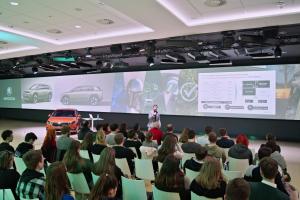
Forty Master's and Bachelor's students from the Masaryk Institute of Advanced Studies (MIAS) attended a full-day programme at Škoda Auto in Mladá Boleslav. It consisted of five very interesting lectures in the morning, the so-called Day with Purchase, and an afternoon visit to the production plant and the Škoda Auto Museum. The event was thematically very close to the professional focus of the MIAS students, so even during the lectures, many questions and observations were posed by the students. Some of them expressed interest in further contact with the company in the preparation of their thesis.
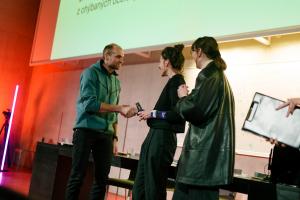
The 30th anniversary edition of the iconic student competition Olověný Dušan selected the best studio works created at Faculty of Architecture. The prize in the Architecture category went to Timotej Hlaváček for his 7000t tomato project and in the Design category to Tereza Cvrčková for her design of an anti-parking barrier. The best architectural studio is Kuzemenský-Kunarová, and the best design studio is Streit-Polák.
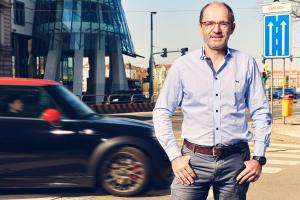
According to the ranking of the best institutions in the field of Computer Science, computer scientists from Faculty of Electrical Engineering and Czech Institute of Informatics, Robotics and Cybernetics of CTU in Prague are among the European leaders in selected fields. In the field of Computer Vision, researchers from CTU FEL and CTU CIIRC rank among the top five European institutions in the evaluation of scientific results in the period 2018 to 2023.
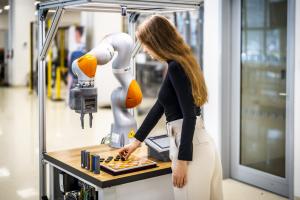
The National Centre for Industry 4.0 in cooperation with Škoda Auto and the Technological Literacy platform welcomed more than 280 primary and secondary school students as part of an educational event on modern technologies on 20 and 21 March. The aim of this cooperation was to introduce new technologies to young people in an engaging way and to show them in practice. The programme included a guided tour of the RICAIP Testbed for Industry 4.0 at the CIIRC CTU in Prague.

Research in genetics, biomedicine, archaeology or ecology leaves behind a huge amount of data, which is difficult to use. This valuable data cannot just be left lying around, because in medicine, for example, we could lose information important for research into incurable diseases. Data management planning is key to solving this problem. However, it is challenging and feared by scientists. A team from Faculty of Information Technology at Czech Technical University in Prague (FIT CTU) has developed an effective solution in the form of the Data Stewardship Wizard (DSW). This tool helps to plan how to make the best use of existing data, describe the resulting data correctly, store it and make it available for scientific purposes to universities and other research organisations in the EU and around the world. The tool is also recommended by the European Commission.
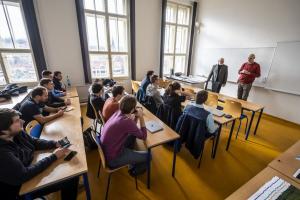
On Tuesday 14. 3. 2023, students of the Faculty of Transportation Sciences of CTU in Prague had an opportunity to meet Daniel Herman, honorary consul of the principality of Liechtenstein in the Czech Republic.
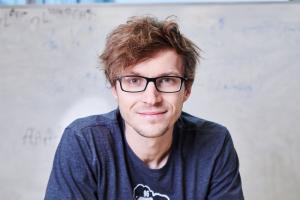
The European Mathematical Society (EMS) has established the EMS Young Academy (EMYA) to support young researchers in mathematics. The organisation consists of Ph.D. students and recent Ph.D. graduates. It will have a total of 120 members, who will be elected successively for four-year terms. Each year, there is an election in which a quarter of the members is elected. This year, RNDr. Zdeněk Mihula, Ph.D. from the Department of Mathematics of the Faculty of Electrical Engineering of CTU, is among the first ever thirty mathematicians who received a mandate.
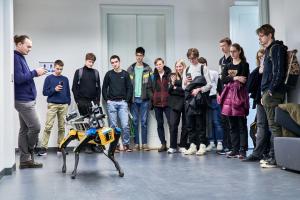
2023/03/16
On 10 March, sixty high school students arrived at the Become an AI Expert for a Day event held at the Faculty of Electrical Engineering of CTU. The participants visited four laboratories where teachers and PhD students from the CTU Faculty of Electrical Engineering presented AI research projects and the students tried out various practical tasks.
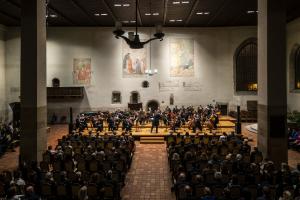
2023/03/15
On Tuesday, March 14th, music composed by Wolfgang Amadeus Mozart and Antonín Dvořák rang out in the Bethlehem Chapel in the traditional CTU Spring Concert.
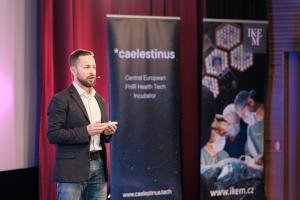
Faculty of Biomedical Engineering has concluded an agreement with Insane Business Ideas s.r.o. on cooperation in the innovation and educational project Caelestinus organized by Insane Business Ideas s.r.o. with the aim of supporting the development of Czech startups in the field of technology in medicine and healthcare.